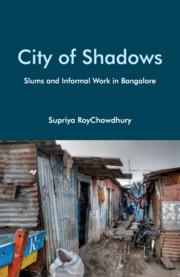Book contents
- Frontmatter
- Contents
- List of Tables
- Acknowledgements
- 1 Introduction
- 2 Welfare and Work: State Autonomy Revisited
- 3 Urban Poverty and Informal Work
- 4 A Political Economy Overview: Karnataka and Bangalore
- 5 New Slums: Migration, Livelihoods and Living
- 6 Old Slums
- 7 Impact of Slum Housing Policies: Bangalore’s New Ghettoes
- 8 Women Workers in Bangalore’s Garment Export Companies
- 9 Conclusion
- Index
1 - Introduction
Published online by Cambridge University Press: 31 July 2021
- Frontmatter
- Contents
- List of Tables
- Acknowledgements
- 1 Introduction
- 2 Welfare and Work: State Autonomy Revisited
- 3 Urban Poverty and Informal Work
- 4 A Political Economy Overview: Karnataka and Bangalore
- 5 New Slums: Migration, Livelihoods and Living
- 6 Old Slums
- 7 Impact of Slum Housing Policies: Bangalore’s New Ghettoes
- 8 Women Workers in Bangalore’s Garment Export Companies
- 9 Conclusion
- Index
Summary
The debate on urban theories
In the late 20th and early 21st centuries, socio-economic exclusions, deeply encrusted in cities of both the Global North and the South, not only contradict earlier understandings of the urban as homogeneous and uniform, but also pose serious challenges to the modernisation theory – entrapped understanding of the urban as a process and promise of development which will engulf all. Emerging debates are linked by two fundamental dilemmas: First, how does the specificity of the regional/local and the diverse trajectories thereof call for a distinct theory of the city in the Global South? Second, what could be an appropriate conceptual framework for imagining urban marginalities?
The argument for specificity, in post-colonial theorisations of cities of the Global South, rests largely on the deep and stubborn pockets of poverty and social marginalisation in which many disadvantaged urban communities continue to live. Moving away from overarching theories of Southern exclusion, drawn from dependency and world-systems theories, recent scholarship on cities in the Global South has understood urban exclusion primarily in terms of space, broadly defined. Scholars have critiqued typical policy frameworks which see slums in Third World cities as only material spaces to be measured and reconstructed. Instead, and drawing closely on David Harvey's (2009 [1973]) conceptual distinction of space as material and relative, they have pointed to the need to see urban marginality, slums in particular, in terms of the context in which they evolved as spaces for living and livelihood (a process which is negotiated and incremental), their porous and fluid character (in contrast to the exclusivity of the residential space of upper-class urban citizens) (Bhan 2019), and their often seemingly contradictory opposition to state-sponsored housing projects. These features – more or less ubiquitous in cities of the Global South – of urban exclusion have led scholars to new ways of thinking about urbanisation, rooted in the Southern context. Theresa Caldeira's (2017) conception of peripheral urbanisation sees the space in which the urban poor live as one marked by a particular kind of temporality and agency, with a set of relations to law and property that are very different from those that characterise the formal domain, which generate a distinct kind of politics and therefore necessarily lead to highly unequal and diverse cities.
- Type
- Chapter
- Information
- City of ShadowsSlums and Informal Work in Bangalore, pp. 1 - 21Publisher: Cambridge University PressPrint publication year: 2021



